Reflective Essay: Mass Surveillance, Crime/Terrorism Protection?
VerifiedAdded on 2023/01/18
|8
|2373
|35
Essay
AI Summary
This reflective essay delves into the ongoing debate surrounding mass surveillance and its effectiveness in protecting society from crime and terrorism. It explores the practices of mass surveillance, including CCTV monitoring, wiretapping, and data collection, and analyzes arguments for and against its implementation. The essay discusses the potential benefits, such as improved public safety and crime reduction, while also addressing concerns about violations of human rights, particularly the right to privacy. It examines the role of metadata and its implications, and explores the use of ethical technologies to balance security with individual freedoms. The essay also presents arguments from various sources, including public incidents and expert opinions, to evaluate whether mass surveillance truly protects individuals from criminal activities and terrorism, considering the balance between security and privacy in a contemporary environment.

Essay
Paraphrase This Document
Need a fresh take? Get an instant paraphrase of this document with our AI Paraphraser

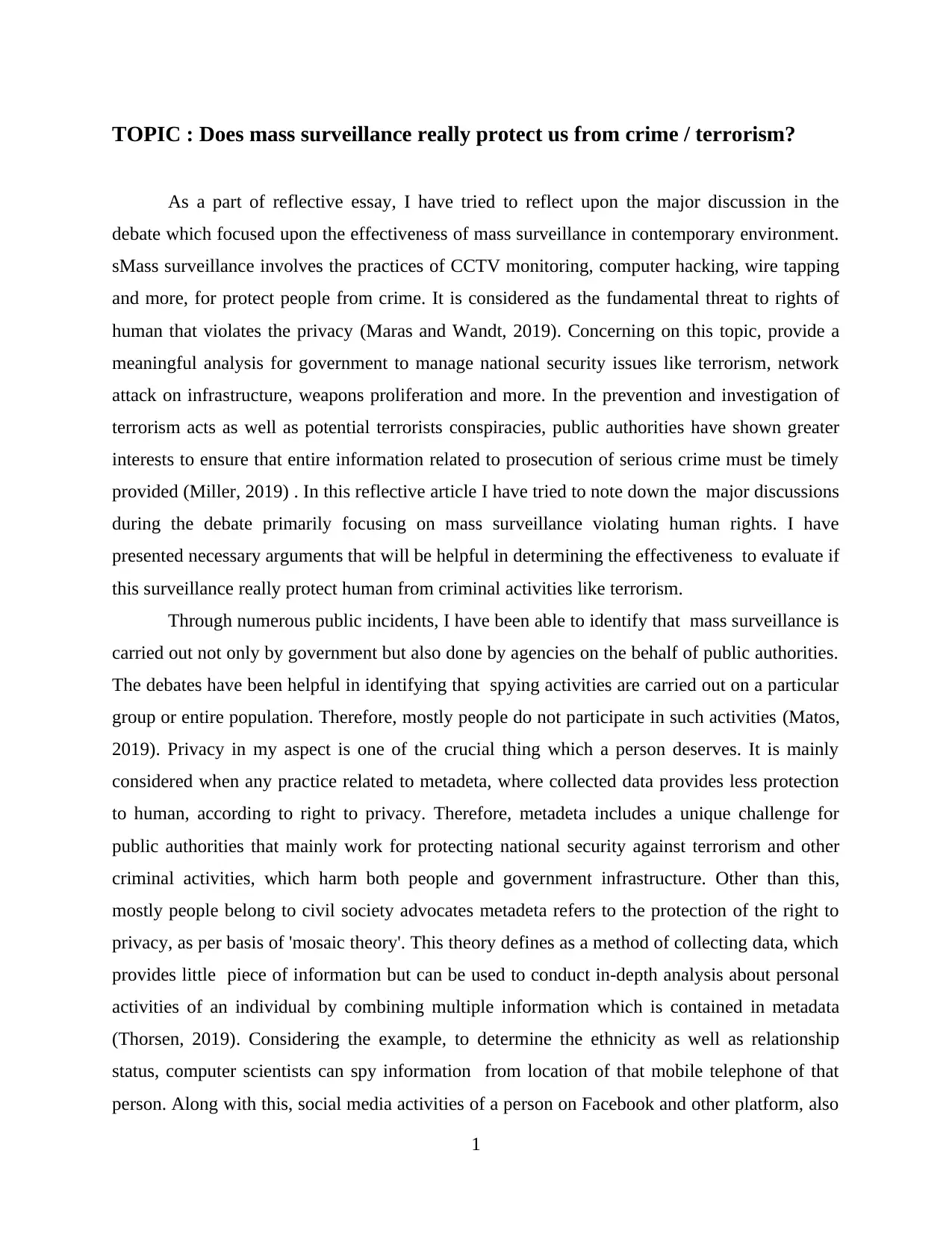
TOPIC : Does mass surveillance really protect us from crime / terrorism?
As a part of reflective essay, I have tried to reflect upon the major discussion in the
debate which focused upon the effectiveness of mass surveillance in contemporary environment.
sMass surveillance involves the practices of CCTV monitoring, computer hacking, wire tapping
and more, for protect people from crime. It is considered as the fundamental threat to rights of
human that violates the privacy (Maras and Wandt, 2019). Concerning on this topic, provide a
meaningful analysis for government to manage national security issues like terrorism, network
attack on infrastructure, weapons proliferation and more. In the prevention and investigation of
terrorism acts as well as potential terrorists conspiracies, public authorities have shown greater
interests to ensure that entire information related to prosecution of serious crime must be timely
provided (Miller, 2019) . In this reflective article I have tried to note down the major discussions
during the debate primarily focusing on mass surveillance violating human rights. I have
presented necessary arguments that will be helpful in determining the effectiveness to evaluate if
this surveillance really protect human from criminal activities like terrorism.
Through numerous public incidents, I have been able to identify that mass surveillance is
carried out not only by government but also done by agencies on the behalf of public authorities.
The debates have been helpful in identifying that spying activities are carried out on a particular
group or entire population. Therefore, mostly people do not participate in such activities (Matos,
2019). Privacy in my aspect is one of the crucial thing which a person deserves. It is mainly
considered when any practice related to metadeta, where collected data provides less protection
to human, according to right to privacy. Therefore, metadeta includes a unique challenge for
public authorities that mainly work for protecting national security against terrorism and other
criminal activities, which harm both people and government infrastructure. Other than this,
mostly people belong to civil society advocates metadeta refers to the protection of the right to
privacy, as per basis of 'mosaic theory'. This theory defines as a method of collecting data, which
provides little piece of information but can be used to conduct in-depth analysis about personal
activities of an individual by combining multiple information which is contained in metadata
(Thorsen, 2019). Considering the example, to determine the ethnicity as well as relationship
status, computer scientists can spy information from location of that mobile telephone of that
person. Along with this, social media activities of a person on Facebook and other platform, also
1
As a part of reflective essay, I have tried to reflect upon the major discussion in the
debate which focused upon the effectiveness of mass surveillance in contemporary environment.
sMass surveillance involves the practices of CCTV monitoring, computer hacking, wire tapping
and more, for protect people from crime. It is considered as the fundamental threat to rights of
human that violates the privacy (Maras and Wandt, 2019). Concerning on this topic, provide a
meaningful analysis for government to manage national security issues like terrorism, network
attack on infrastructure, weapons proliferation and more. In the prevention and investigation of
terrorism acts as well as potential terrorists conspiracies, public authorities have shown greater
interests to ensure that entire information related to prosecution of serious crime must be timely
provided (Miller, 2019) . In this reflective article I have tried to note down the major discussions
during the debate primarily focusing on mass surveillance violating human rights. I have
presented necessary arguments that will be helpful in determining the effectiveness to evaluate if
this surveillance really protect human from criminal activities like terrorism.
Through numerous public incidents, I have been able to identify that mass surveillance is
carried out not only by government but also done by agencies on the behalf of public authorities.
The debates have been helpful in identifying that spying activities are carried out on a particular
group or entire population. Therefore, mostly people do not participate in such activities (Matos,
2019). Privacy in my aspect is one of the crucial thing which a person deserves. It is mainly
considered when any practice related to metadeta, where collected data provides less protection
to human, according to right to privacy. Therefore, metadeta includes a unique challenge for
public authorities that mainly work for protecting national security against terrorism and other
criminal activities, which harm both people and government infrastructure. Other than this,
mostly people belong to civil society advocates metadeta refers to the protection of the right to
privacy, as per basis of 'mosaic theory'. This theory defines as a method of collecting data, which
provides little piece of information but can be used to conduct in-depth analysis about personal
activities of an individual by combining multiple information which is contained in metadata
(Thorsen, 2019). Considering the example, to determine the ethnicity as well as relationship
status, computer scientists can spy information from location of that mobile telephone of that
person. Along with this, social media activities of a person on Facebook and other platform, also
1
⊘ This is a preview!⊘
Do you want full access?
Subscribe today to unlock all pages.

Trusted by 1+ million students worldwide
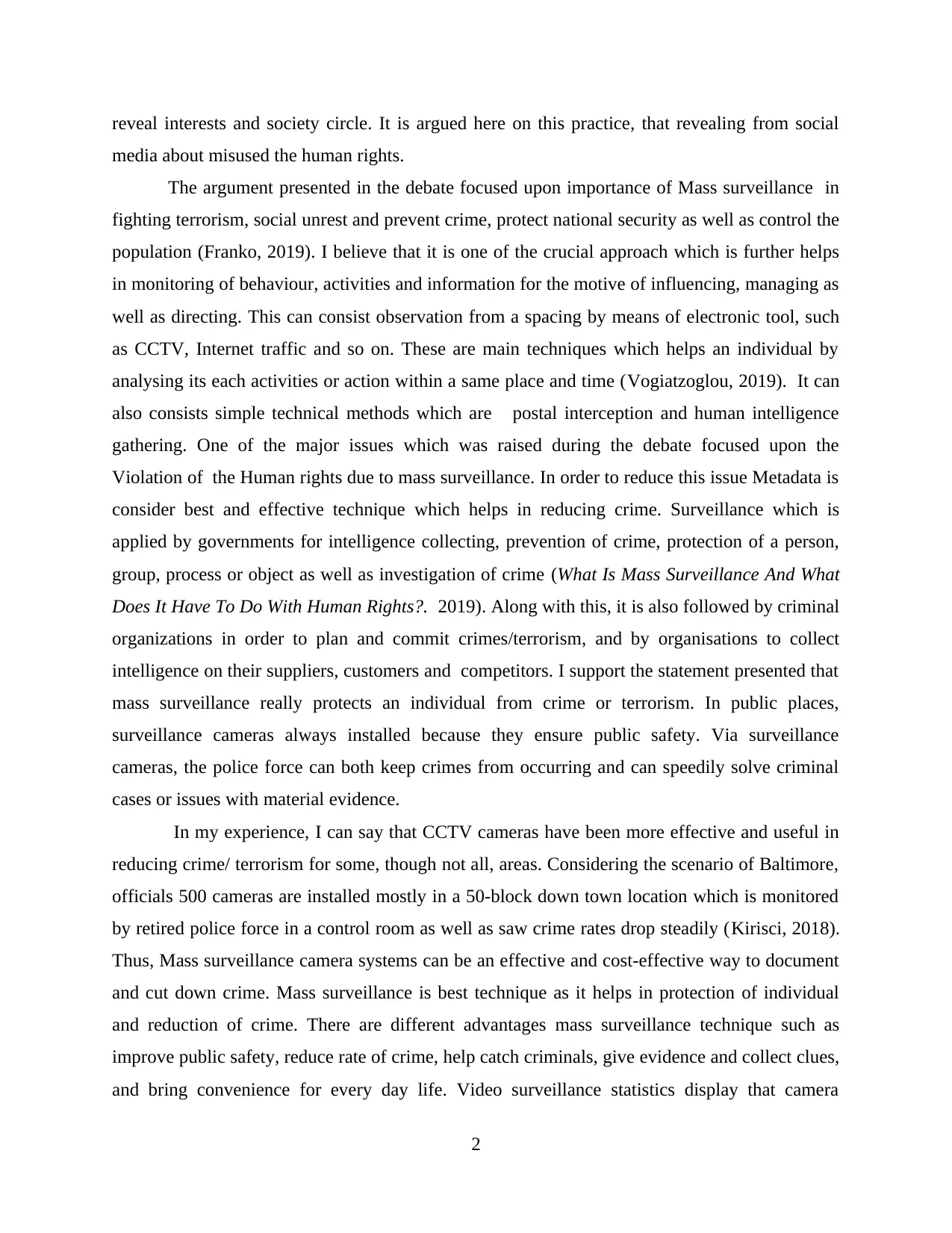
reveal interests and society circle. It is argued here on this practice, that revealing from social
media about misused the human rights.
The argument presented in the debate focused upon importance of Mass surveillance in
fighting terrorism, social unrest and prevent crime, protect national security as well as control the
population (Franko, 2019). I believe that it is one of the crucial approach which is further helps
in monitoring of behaviour, activities and information for the motive of influencing, managing as
well as directing. This can consist observation from a spacing by means of electronic tool, such
as CCTV, Internet traffic and so on. These are main techniques which helps an individual by
analysing its each activities or action within a same place and time (Vogiatzoglou, 2019). It can
also consists simple technical methods which are postal interception and human intelligence
gathering. One of the major issues which was raised during the debate focused upon the
Violation of the Human rights due to mass surveillance. In order to reduce this issue Metadata is
consider best and effective technique which helps in reducing crime. Surveillance which is
applied by governments for intelligence collecting, prevention of crime, protection of a person,
group, process or object as well as investigation of crime (What Is Mass Surveillance And What
Does It Have To Do With Human Rights?. 2019). Along with this, it is also followed by criminal
organizations in order to plan and commit crimes/terrorism, and by organisations to collect
intelligence on their suppliers, customers and competitors. I support the statement presented that
mass surveillance really protects an individual from crime or terrorism. In public places,
surveillance cameras always installed because they ensure public safety. Via surveillance
cameras, the police force can both keep crimes from occurring and can speedily solve criminal
cases or issues with material evidence.
In my experience, I can say that CCTV cameras have been more effective and useful in
reducing crime/ terrorism for some, though not all, areas. Considering the scenario of Baltimore,
officials 500 cameras are installed mostly in a 50-block down town location which is monitored
by retired police force in a control room as well as saw crime rates drop steadily (Kirisci, 2018).
Thus, Mass surveillance camera systems can be an effective and cost-effective way to document
and cut down crime. Mass surveillance is best technique as it helps in protection of individual
and reduction of crime. There are different advantages mass surveillance technique such as
improve public safety, reduce rate of crime, help catch criminals, give evidence and collect clues,
and bring convenience for every day life. Video surveillance statistics display that camera
2
media about misused the human rights.
The argument presented in the debate focused upon importance of Mass surveillance in
fighting terrorism, social unrest and prevent crime, protect national security as well as control the
population (Franko, 2019). I believe that it is one of the crucial approach which is further helps
in monitoring of behaviour, activities and information for the motive of influencing, managing as
well as directing. This can consist observation from a spacing by means of electronic tool, such
as CCTV, Internet traffic and so on. These are main techniques which helps an individual by
analysing its each activities or action within a same place and time (Vogiatzoglou, 2019). It can
also consists simple technical methods which are postal interception and human intelligence
gathering. One of the major issues which was raised during the debate focused upon the
Violation of the Human rights due to mass surveillance. In order to reduce this issue Metadata is
consider best and effective technique which helps in reducing crime. Surveillance which is
applied by governments for intelligence collecting, prevention of crime, protection of a person,
group, process or object as well as investigation of crime (What Is Mass Surveillance And What
Does It Have To Do With Human Rights?. 2019). Along with this, it is also followed by criminal
organizations in order to plan and commit crimes/terrorism, and by organisations to collect
intelligence on their suppliers, customers and competitors. I support the statement presented that
mass surveillance really protects an individual from crime or terrorism. In public places,
surveillance cameras always installed because they ensure public safety. Via surveillance
cameras, the police force can both keep crimes from occurring and can speedily solve criminal
cases or issues with material evidence.
In my experience, I can say that CCTV cameras have been more effective and useful in
reducing crime/ terrorism for some, though not all, areas. Considering the scenario of Baltimore,
officials 500 cameras are installed mostly in a 50-block down town location which is monitored
by retired police force in a control room as well as saw crime rates drop steadily (Kirisci, 2018).
Thus, Mass surveillance camera systems can be an effective and cost-effective way to document
and cut down crime. Mass surveillance is best technique as it helps in protection of individual
and reduction of crime. There are different advantages mass surveillance technique such as
improve public safety, reduce rate of crime, help catch criminals, give evidence and collect clues,
and bring convenience for every day life. Video surveillance statistics display that camera
2
Paraphrase This Document
Need a fresh take? Get an instant paraphrase of this document with our AI Paraphraser
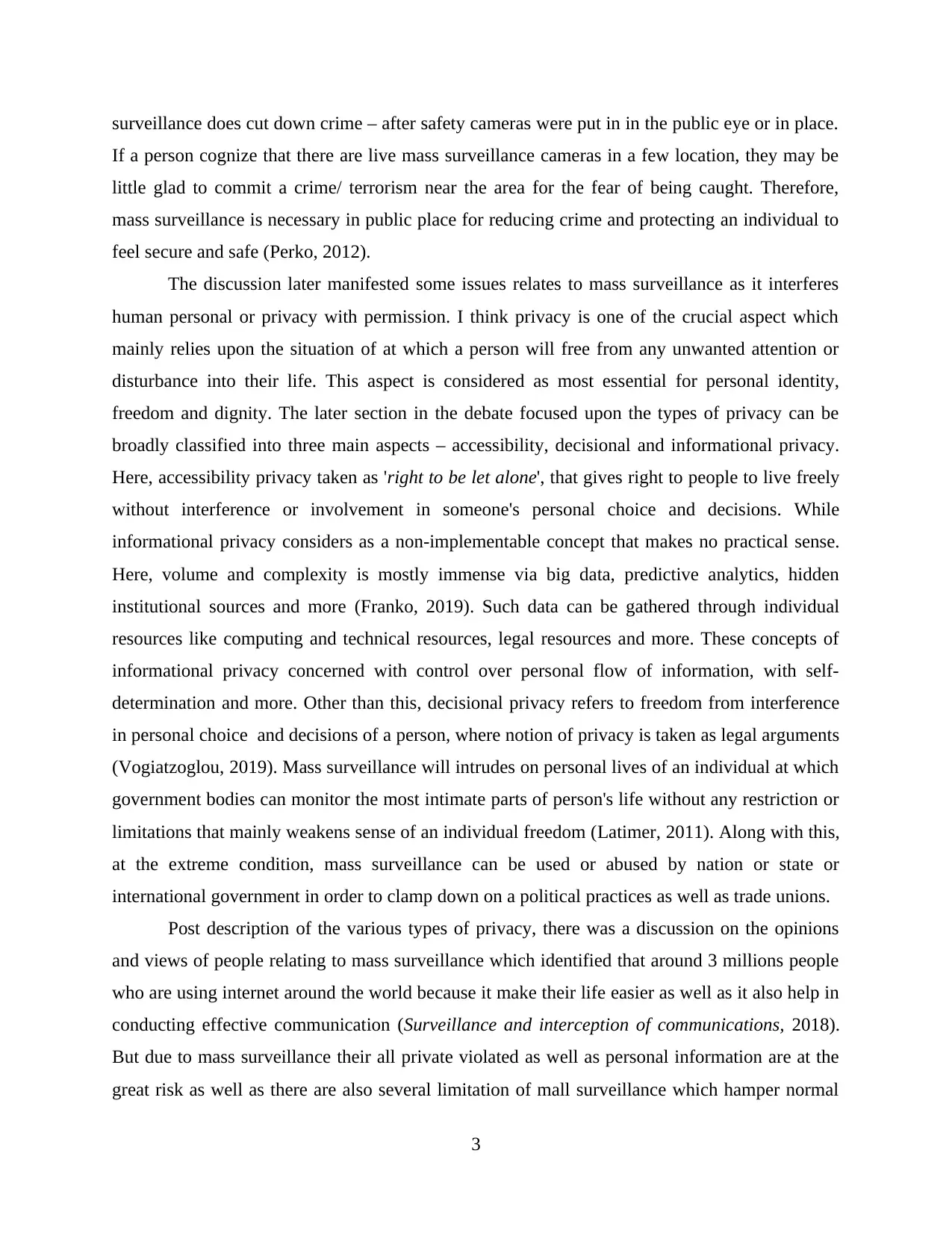
surveillance does cut down crime – after safety cameras were put in in the public eye or in place.
If a person cognize that there are live mass surveillance cameras in a few location, they may be
little glad to commit a crime/ terrorism near the area for the fear of being caught. Therefore,
mass surveillance is necessary in public place for reducing crime and protecting an individual to
feel secure and safe (Perko, 2012).
The discussion later manifested some issues relates to mass surveillance as it interferes
human personal or privacy with permission. I think privacy is one of the crucial aspect which
mainly relies upon the situation of at which a person will free from any unwanted attention or
disturbance into their life. This aspect is considered as most essential for personal identity,
freedom and dignity. The later section in the debate focused upon the types of privacy can be
broadly classified into three main aspects – accessibility, decisional and informational privacy.
Here, accessibility privacy taken as 'right to be let alone', that gives right to people to live freely
without interference or involvement in someone's personal choice and decisions. While
informational privacy considers as a non-implementable concept that makes no practical sense.
Here, volume and complexity is mostly immense via big data, predictive analytics, hidden
institutional sources and more (Franko, 2019). Such data can be gathered through individual
resources like computing and technical resources, legal resources and more. These concepts of
informational privacy concerned with control over personal flow of information, with self-
determination and more. Other than this, decisional privacy refers to freedom from interference
in personal choice and decisions of a person, where notion of privacy is taken as legal arguments
(Vogiatzoglou, 2019). Mass surveillance will intrudes on personal lives of an individual at which
government bodies can monitor the most intimate parts of person's life without any restriction or
limitations that mainly weakens sense of an individual freedom (Latimer, 2011). Along with this,
at the extreme condition, mass surveillance can be used or abused by nation or state or
international government in order to clamp down on a political practices as well as trade unions.
Post description of the various types of privacy, there was a discussion on the opinions
and views of people relating to mass surveillance which identified that around 3 millions people
who are using internet around the world because it make their life easier as well as it also help in
conducting effective communication (Surveillance and interception of communications, 2018).
But due to mass surveillance their all private violated as well as personal information are at the
great risk as well as there are also several limitation of mall surveillance which hamper normal
3
If a person cognize that there are live mass surveillance cameras in a few location, they may be
little glad to commit a crime/ terrorism near the area for the fear of being caught. Therefore,
mass surveillance is necessary in public place for reducing crime and protecting an individual to
feel secure and safe (Perko, 2012).
The discussion later manifested some issues relates to mass surveillance as it interferes
human personal or privacy with permission. I think privacy is one of the crucial aspect which
mainly relies upon the situation of at which a person will free from any unwanted attention or
disturbance into their life. This aspect is considered as most essential for personal identity,
freedom and dignity. The later section in the debate focused upon the types of privacy can be
broadly classified into three main aspects – accessibility, decisional and informational privacy.
Here, accessibility privacy taken as 'right to be let alone', that gives right to people to live freely
without interference or involvement in someone's personal choice and decisions. While
informational privacy considers as a non-implementable concept that makes no practical sense.
Here, volume and complexity is mostly immense via big data, predictive analytics, hidden
institutional sources and more (Franko, 2019). Such data can be gathered through individual
resources like computing and technical resources, legal resources and more. These concepts of
informational privacy concerned with control over personal flow of information, with self-
determination and more. Other than this, decisional privacy refers to freedom from interference
in personal choice and decisions of a person, where notion of privacy is taken as legal arguments
(Vogiatzoglou, 2019). Mass surveillance will intrudes on personal lives of an individual at which
government bodies can monitor the most intimate parts of person's life without any restriction or
limitations that mainly weakens sense of an individual freedom (Latimer, 2011). Along with this,
at the extreme condition, mass surveillance can be used or abused by nation or state or
international government in order to clamp down on a political practices as well as trade unions.
Post description of the various types of privacy, there was a discussion on the opinions
and views of people relating to mass surveillance which identified that around 3 millions people
who are using internet around the world because it make their life easier as well as it also help in
conducting effective communication (Surveillance and interception of communications, 2018).
But due to mass surveillance their all private violated as well as personal information are at the
great risk as well as there are also several limitation of mall surveillance which hamper normal
3
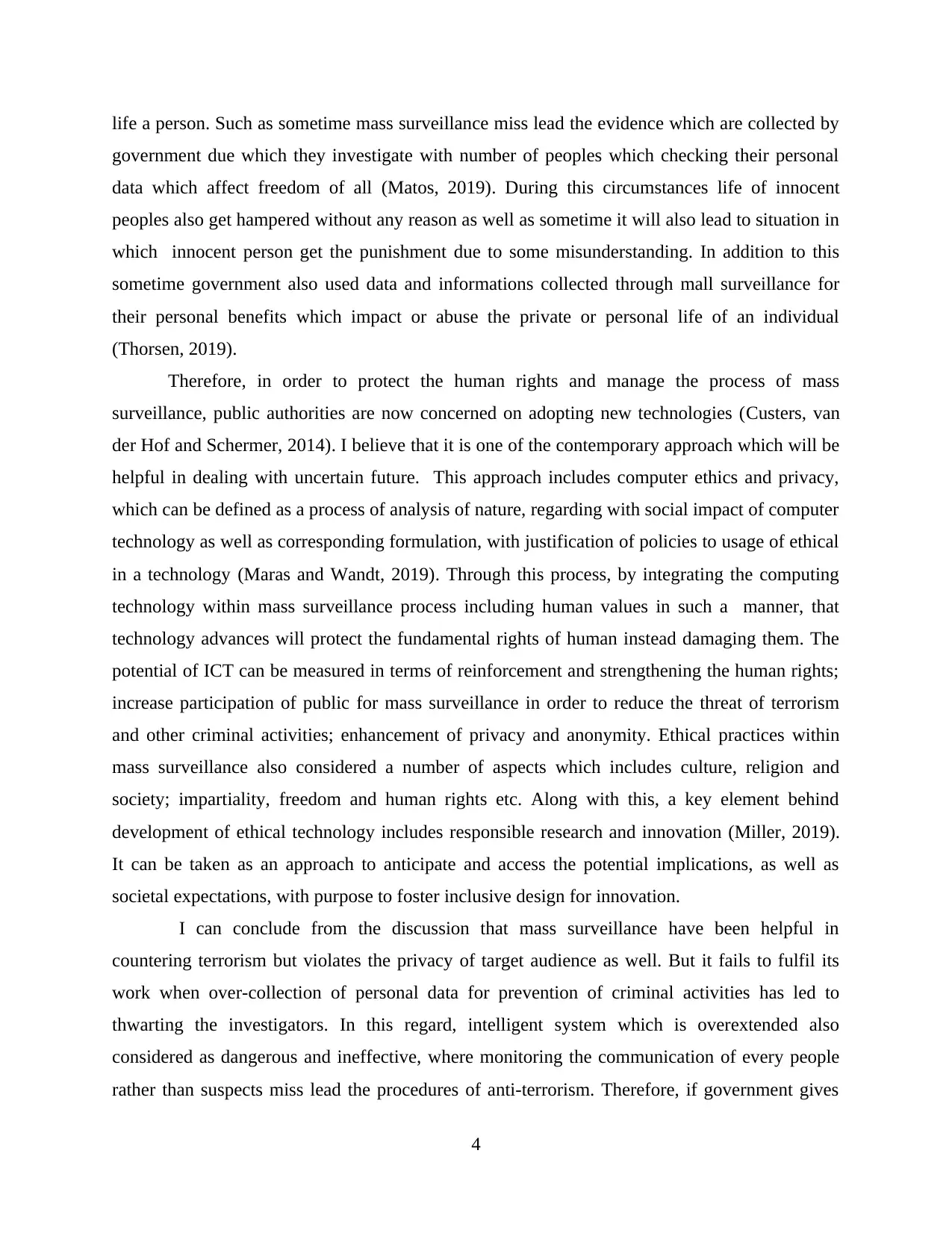
life a person. Such as sometime mass surveillance miss lead the evidence which are collected by
government due which they investigate with number of peoples which checking their personal
data which affect freedom of all (Matos, 2019). During this circumstances life of innocent
peoples also get hampered without any reason as well as sometime it will also lead to situation in
which innocent person get the punishment due to some misunderstanding. In addition to this
sometime government also used data and informations collected through mall surveillance for
their personal benefits which impact or abuse the private or personal life of an individual
(Thorsen, 2019).
Therefore, in order to protect the human rights and manage the process of mass
surveillance, public authorities are now concerned on adopting new technologies (Custers, van
der Hof and Schermer, 2014). I believe that it is one of the contemporary approach which will be
helpful in dealing with uncertain future. This approach includes computer ethics and privacy,
which can be defined as a process of analysis of nature, regarding with social impact of computer
technology as well as corresponding formulation, with justification of policies to usage of ethical
in a technology (Maras and Wandt, 2019). Through this process, by integrating the computing
technology within mass surveillance process including human values in such a manner, that
technology advances will protect the fundamental rights of human instead damaging them. The
potential of ICT can be measured in terms of reinforcement and strengthening the human rights;
increase participation of public for mass surveillance in order to reduce the threat of terrorism
and other criminal activities; enhancement of privacy and anonymity. Ethical practices within
mass surveillance also considered a number of aspects which includes culture, religion and
society; impartiality, freedom and human rights etc. Along with this, a key element behind
development of ethical technology includes responsible research and innovation (Miller, 2019).
It can be taken as an approach to anticipate and access the potential implications, as well as
societal expectations, with purpose to foster inclusive design for innovation.
I can conclude from the discussion that mass surveillance have been helpful in
countering terrorism but violates the privacy of target audience as well. But it fails to fulfil its
work when over-collection of personal data for prevention of criminal activities has led to
thwarting the investigators. In this regard, intelligent system which is overextended also
considered as dangerous and ineffective, where monitoring the communication of every people
rather than suspects miss lead the procedures of anti-terrorism. Therefore, if government gives
4
government due which they investigate with number of peoples which checking their personal
data which affect freedom of all (Matos, 2019). During this circumstances life of innocent
peoples also get hampered without any reason as well as sometime it will also lead to situation in
which innocent person get the punishment due to some misunderstanding. In addition to this
sometime government also used data and informations collected through mall surveillance for
their personal benefits which impact or abuse the private or personal life of an individual
(Thorsen, 2019).
Therefore, in order to protect the human rights and manage the process of mass
surveillance, public authorities are now concerned on adopting new technologies (Custers, van
der Hof and Schermer, 2014). I believe that it is one of the contemporary approach which will be
helpful in dealing with uncertain future. This approach includes computer ethics and privacy,
which can be defined as a process of analysis of nature, regarding with social impact of computer
technology as well as corresponding formulation, with justification of policies to usage of ethical
in a technology (Maras and Wandt, 2019). Through this process, by integrating the computing
technology within mass surveillance process including human values in such a manner, that
technology advances will protect the fundamental rights of human instead damaging them. The
potential of ICT can be measured in terms of reinforcement and strengthening the human rights;
increase participation of public for mass surveillance in order to reduce the threat of terrorism
and other criminal activities; enhancement of privacy and anonymity. Ethical practices within
mass surveillance also considered a number of aspects which includes culture, religion and
society; impartiality, freedom and human rights etc. Along with this, a key element behind
development of ethical technology includes responsible research and innovation (Miller, 2019).
It can be taken as an approach to anticipate and access the potential implications, as well as
societal expectations, with purpose to foster inclusive design for innovation.
I can conclude from the discussion that mass surveillance have been helpful in
countering terrorism but violates the privacy of target audience as well. But it fails to fulfil its
work when over-collection of personal data for prevention of criminal activities has led to
thwarting the investigators. In this regard, intelligent system which is overextended also
considered as dangerous and ineffective, where monitoring the communication of every people
rather than suspects miss lead the procedures of anti-terrorism. Therefore, if government gives
4
⊘ This is a preview!⊘
Do you want full access?
Subscribe today to unlock all pages.

Trusted by 1+ million students worldwide
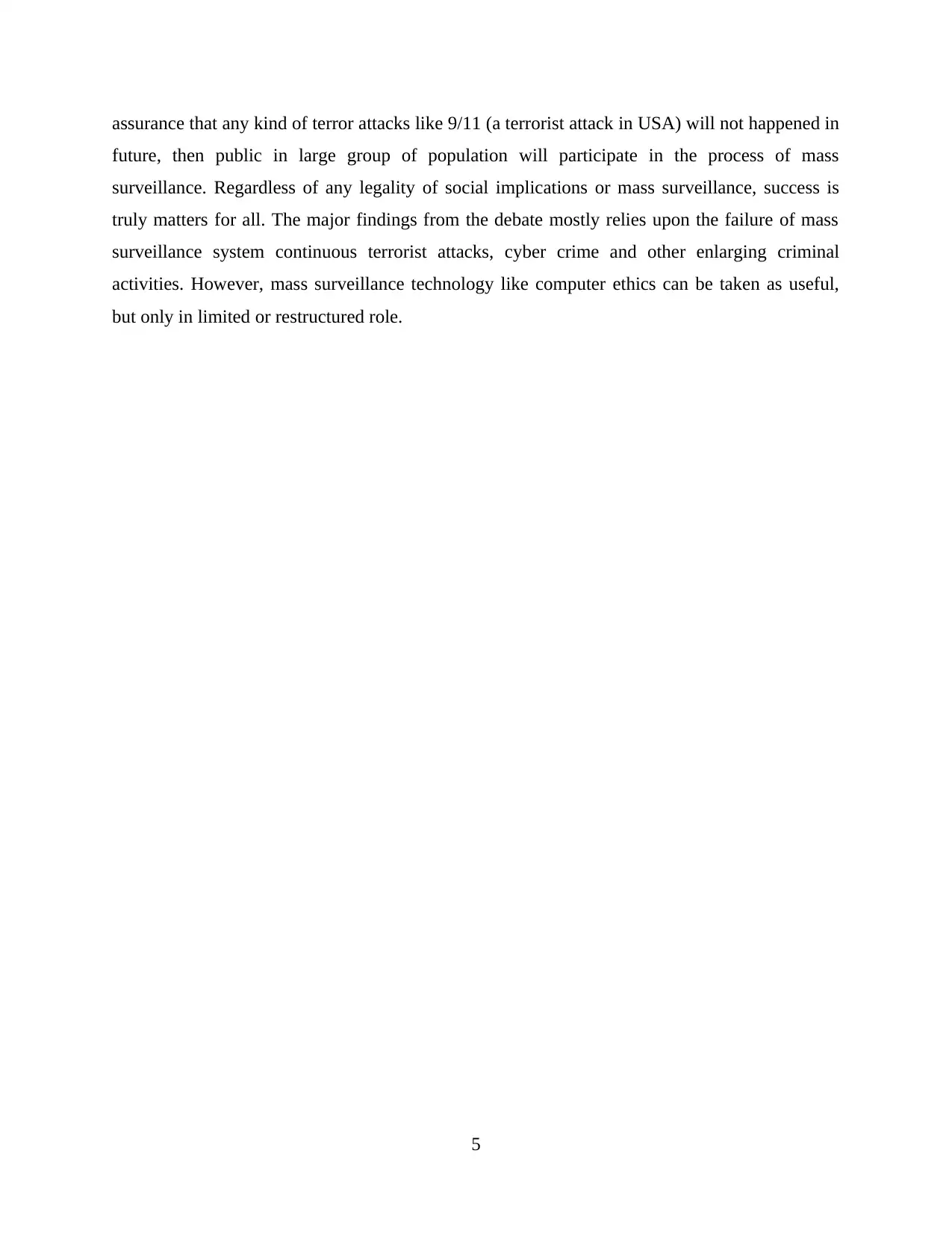
assurance that any kind of terror attacks like 9/11 (a terrorist attack in USA) will not happened in
future, then public in large group of population will participate in the process of mass
surveillance. Regardless of any legality of social implications or mass surveillance, success is
truly matters for all. The major findings from the debate mostly relies upon the failure of mass
surveillance system continuous terrorist attacks, cyber crime and other enlarging criminal
activities. However, mass surveillance technology like computer ethics can be taken as useful,
but only in limited or restructured role.
5
future, then public in large group of population will participate in the process of mass
surveillance. Regardless of any legality of social implications or mass surveillance, success is
truly matters for all. The major findings from the debate mostly relies upon the failure of mass
surveillance system continuous terrorist attacks, cyber crime and other enlarging criminal
activities. However, mass surveillance technology like computer ethics can be taken as useful,
but only in limited or restructured role.
5
Paraphrase This Document
Need a fresh take? Get an instant paraphrase of this document with our AI Paraphraser
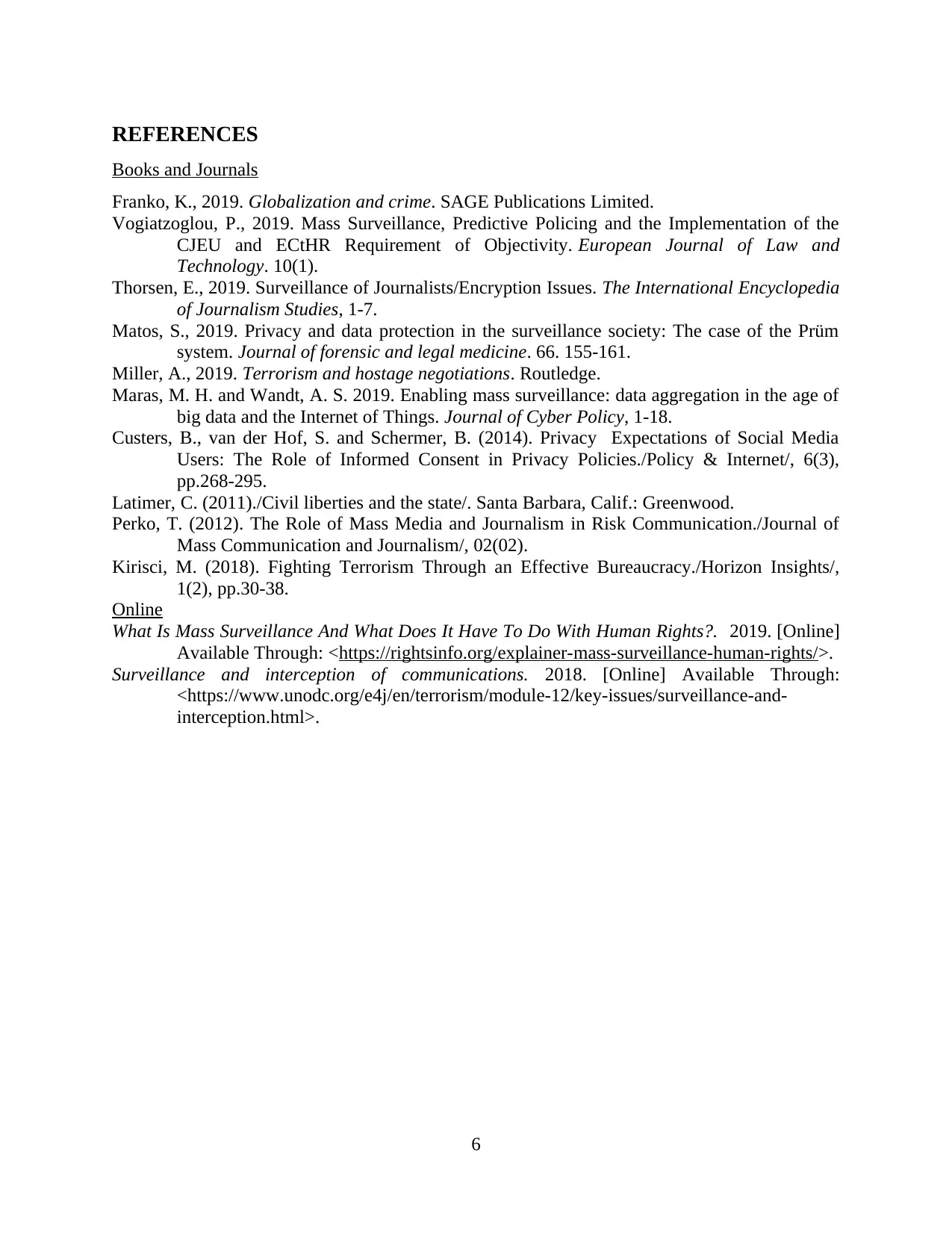
REFERENCES
Books and Journals
Franko, K., 2019. Globalization and crime. SAGE Publications Limited.
Vogiatzoglou, P., 2019. Mass Surveillance, Predictive Policing and the Implementation of the
CJEU and ECtHR Requirement of Objectivity. European Journal of Law and
Technology. 10(1).
Thorsen, E., 2019. Surveillance of Journalists/Encryption Issues. The International Encyclopedia
of Journalism Studies, 1-7.
Matos, S., 2019. Privacy and data protection in the surveillance society: The case of the Prüm
system. Journal of forensic and legal medicine. 66. 155-161.
Miller, A., 2019. Terrorism and hostage negotiations. Routledge.
Maras, M. H. and Wandt, A. S. 2019. Enabling mass surveillance: data aggregation in the age of
big data and the Internet of Things. Journal of Cyber Policy, 1-18.
Custers, B., van der Hof, S. and Schermer, B. (2014). Privacy Expectations of Social Media
Users: The Role of Informed Consent in Privacy Policies./Policy & Internet/, 6(3),
pp.268-295.
Latimer, C. (2011)./Civil liberties and the state/. Santa Barbara, Calif.: Greenwood.
Perko, T. (2012). The Role of Mass Media and Journalism in Risk Communication./Journal of
Mass Communication and Journalism/, 02(02).
Kirisci, M. (2018). Fighting Terrorism Through an Effective Bureaucracy./Horizon Insights/,
1(2), pp.30-38.
Online
What Is Mass Surveillance And What Does It Have To Do With Human Rights?. 2019. [Online]
Available Through: <https://rightsinfo.org/explainer-mass-surveillance-human-rights/>.
Surveillance and interception of communications. 2018. [Online] Available Through:
<https://www.unodc.org/e4j/en/terrorism/module-12/key-issues/surveillance-and-
interception.html>.
6
Books and Journals
Franko, K., 2019. Globalization and crime. SAGE Publications Limited.
Vogiatzoglou, P., 2019. Mass Surveillance, Predictive Policing and the Implementation of the
CJEU and ECtHR Requirement of Objectivity. European Journal of Law and
Technology. 10(1).
Thorsen, E., 2019. Surveillance of Journalists/Encryption Issues. The International Encyclopedia
of Journalism Studies, 1-7.
Matos, S., 2019. Privacy and data protection in the surveillance society: The case of the Prüm
system. Journal of forensic and legal medicine. 66. 155-161.
Miller, A., 2019. Terrorism and hostage negotiations. Routledge.
Maras, M. H. and Wandt, A. S. 2019. Enabling mass surveillance: data aggregation in the age of
big data and the Internet of Things. Journal of Cyber Policy, 1-18.
Custers, B., van der Hof, S. and Schermer, B. (2014). Privacy Expectations of Social Media
Users: The Role of Informed Consent in Privacy Policies./Policy & Internet/, 6(3),
pp.268-295.
Latimer, C. (2011)./Civil liberties and the state/. Santa Barbara, Calif.: Greenwood.
Perko, T. (2012). The Role of Mass Media and Journalism in Risk Communication./Journal of
Mass Communication and Journalism/, 02(02).
Kirisci, M. (2018). Fighting Terrorism Through an Effective Bureaucracy./Horizon Insights/,
1(2), pp.30-38.
Online
What Is Mass Surveillance And What Does It Have To Do With Human Rights?. 2019. [Online]
Available Through: <https://rightsinfo.org/explainer-mass-surveillance-human-rights/>.
Surveillance and interception of communications. 2018. [Online] Available Through:
<https://www.unodc.org/e4j/en/terrorism/module-12/key-issues/surveillance-and-
interception.html>.
6
1 out of 8
Related Documents
Your All-in-One AI-Powered Toolkit for Academic Success.
+13062052269
info@desklib.com
Available 24*7 on WhatsApp / Email
![[object Object]](/_next/static/media/star-bottom.7253800d.svg)
Unlock your academic potential
Copyright © 2020–2026 A2Z Services. All Rights Reserved. Developed and managed by ZUCOL.





